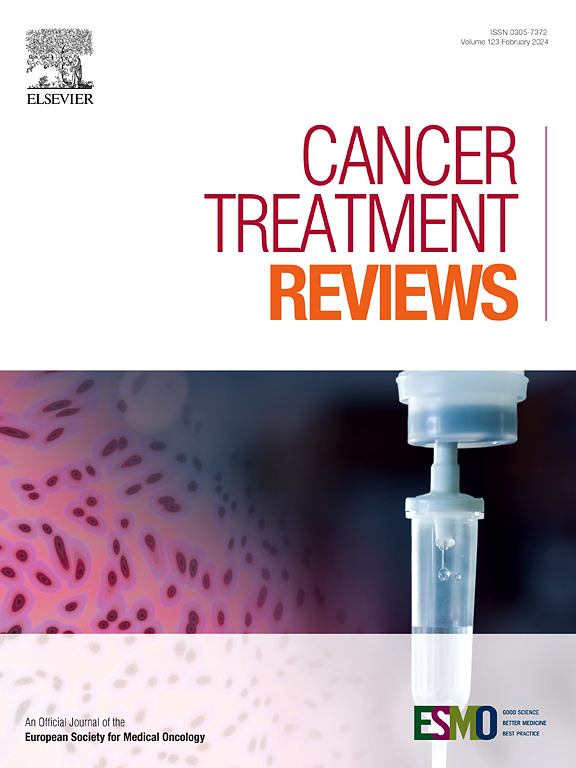Adjuvant CDK4/6 inhibitors in breast cancer: Interpreting trial design, evidence, and uncertainty
IF 9.6
1区 医学
Q1 ONCOLOGY
引用次数: 0
Abstract
Cyclin-dependent kinase 4 and 6 (CDK4/6) inhibitors have transformed the treatment landscape for metastatic hormone receptor–positive, HER2-negative breast cancer by improving progression-free and Overall Survival (OS). In the adjuvant context, however, results have been discordant and remain immature. The PALLAS and PENELOPE-B trials of palbociclib reported no benefit, while monarchE and NATALEE demonstrated improvements in invasive disease-free survival (iDFS) with abemaciclib and ribociclib, respectively, leading to regulatory approvals despite no demonstrated OS benefit yet.
It remains possible that adjuvant CDK4/6 inhibition provides meaningful long-term benefit, but that has not been demonstrated. Concerns related to trial design: risk-enrichment, open-label conduct, high treatment-discontinuation rates, and potential informative censoring complicate interpretation. Although iDFS is a recognized intermediate endpoint with potential psychological validity, it is subject to bias in collection and communication, and has not been validated as a surrogate for OS in this setting. Moreover, early inhibition of CDK4/6 may induce resistance and compromise subsequent efficacy. Reported quality-of-life outcomes were preserved, not improved, which holds limited value considering added toxicity, inconvenience, and cost in a largely curable population.
If even half of eligible patients are treated, estimated annual costs in the United States would exceed $7 billion. As these agents are incorporated into clinical guidelines, it is critical to clarify whether they improve long-term outcomes, delay recurrence without affecting survival, or cause unintended harm. Impulse to intervene early is understandable, but emerging data must be carefully assessed to ensure adjuvant CDK4/6 inhibition offers meaningful benefit to patients and health systems.
乳腺癌的辅助CDK4/6抑制剂:解释试验设计、证据和不确定性
细胞周期蛋白依赖性激酶4和6 (CDK4/6)抑制剂通过改善无进展和总生存期(OS),改变了转移激素受体阳性、her2阴性乳腺癌的治疗前景。然而,在辅助方面,结果是不一致的,仍然不成熟。palbociclib的PALLAS和PENELOPE-B试验报告没有获益,而monarchE和NATALEE分别显示abemaciclib和ribociclib改善了侵袭性无病生存期(iDFS),尽管尚未显示OS获益,但仍获得监管机构批准。佐剂抑制CDK4/6仍有可能提供有意义的长期益处,但尚未得到证实。与试验设计相关的问题:风险增加、开放标签行为、高治疗终止率和潜在的信息审查使解释复杂化。虽然iDFS是公认的具有潜在心理有效性的中间终点,但它在收集和交流中存在偏差,并且尚未被验证为OS的替代品。此外,早期抑制CDK4/6可能导致耐药性并影响后续疗效。报告的生活质量结果得到了保留,而不是改善,考虑到在大部分可治愈的人群中增加的毒性、不便和成本,其价值有限。即使有一半符合条件的患者得到治疗,美国每年的费用估计也将超过70亿美元。当这些药物被纳入临床指南时,明确它们是否能改善长期预后,延缓复发而不影响生存,或造成意外伤害是至关重要的。早期干预的冲动是可以理解的,但必须仔细评估新出现的数据,以确保辅助CDK4/6抑制为患者和卫生系统提供有意义的益处。
本文章由计算机程序翻译,如有差异,请以英文原文为准。
求助全文
约1分钟内获得全文
求助全文
来源期刊

Cancer treatment reviews
医学-肿瘤学
CiteScore
21.40
自引率
0.80%
发文量
109
审稿时长
13 days
期刊介绍:
Cancer Treatment Reviews
Journal Overview:
International journal focused on developments in cancer treatment research
Publishes state-of-the-art, authoritative reviews to keep clinicians and researchers informed
Regular Sections in Each Issue:
Comments on Controversy
Tumor Reviews
Anti-tumor Treatments
New Drugs
Complications of Treatment
General and Supportive Care
Laboratory/Clinic Interface
Submission and Editorial System:
Online submission and editorial system for Cancer Treatment Reviews
 求助内容:
求助内容: 应助结果提醒方式:
应助结果提醒方式:


